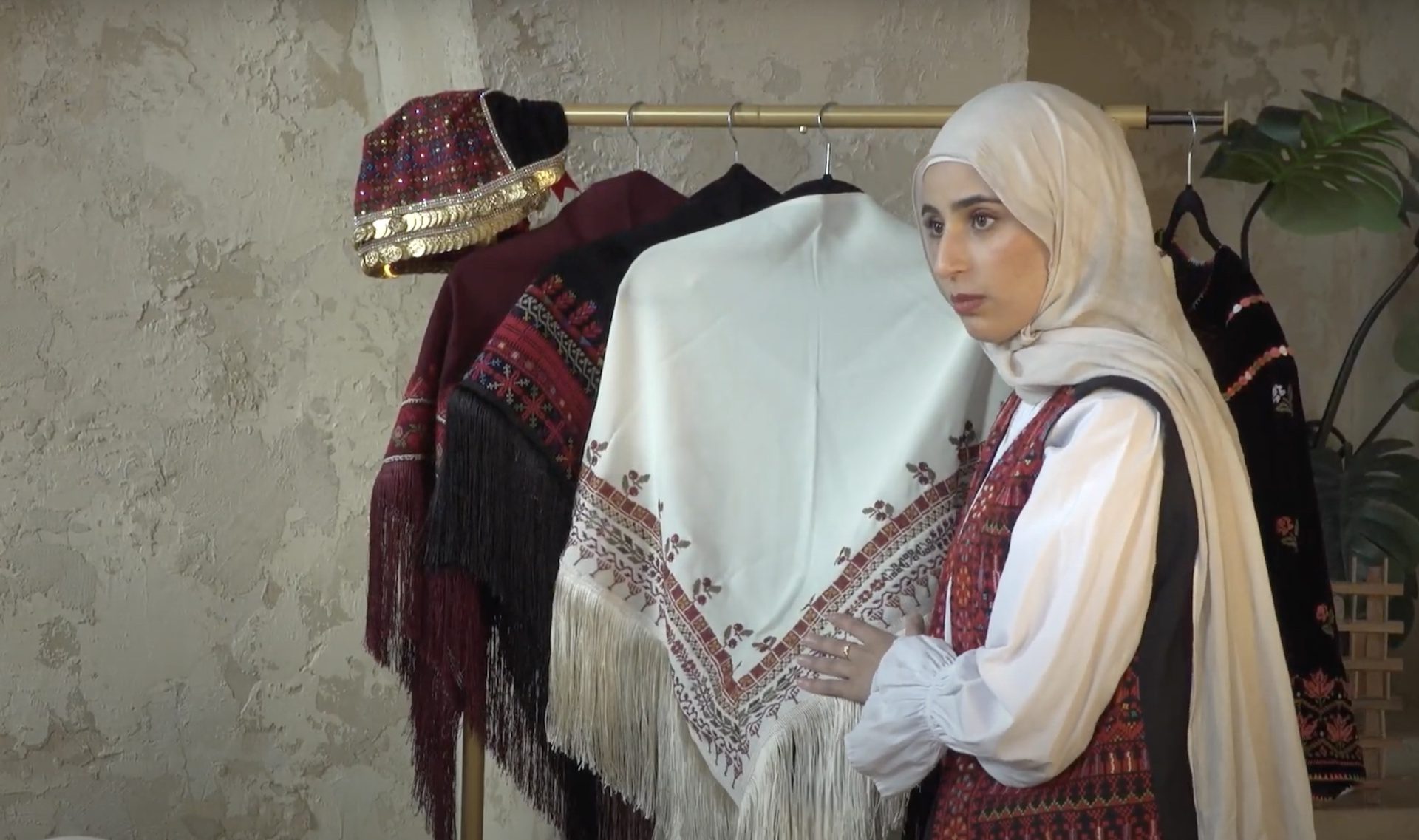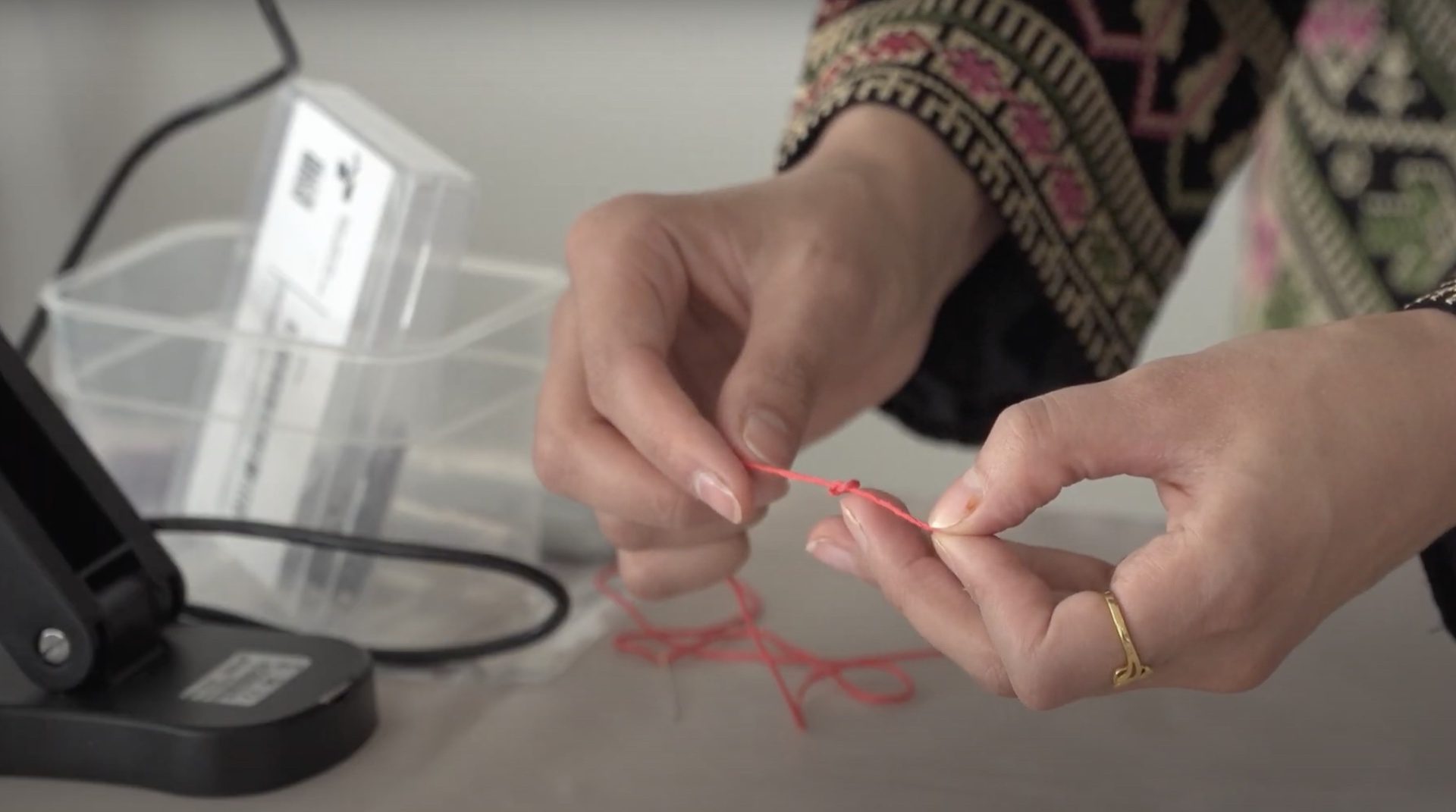
Bayan Fares aprendió punto de cruz palestino cuando tenía 10 años. Ahora enseña a otras personas la forma tradicional del bordado palestino para preservar esta forma de arte en medio de una guerra continua en su tierra natal.
La palestino-estadounidense Bayan Fares es una apasionada de la preservación de su cultura e identidad a través del arte. Esta poetisa y escritora de 28 años nació y creció en Estados Unidos, pero se trasladó a Ammán (Jordania) cuando tenía nueve años. Allí vivió hasta los 14 años para acercarse más a su cultura.
Durante su estancia en Jordania, aprendió el punto de cruz palestino, conocido como tatreez. El bordado tradicional palestino se practica en zonas rurales y suele coserse en batas, manteles, cojines y otras telas. Los motivos simbólicos utilizan pájaros, árboles y flores para representar aspectos de la vida y la cultura palestinas.
En los últimos meses, la comunidad palestina encontrar consuelo en el arte comunitario como el tatreez para difundir su cultura en medio de la guerra en curso en Gaza. Después de que 700.000 palestinos fueran desplazados de sus hogares durante la Nakba en 1948, algunas mujeres vieron en el tatreez una forma de permanecer arraigadas... en sus aldeas destruidas.
Noticias que ponen el poder en el punto de mira y a las comunidades en el centro.
Suscríbase a nuestro boletín gratuito y reciba actualizaciones dos veces por semana.
Desde los atentados del 7 de octubre, la respuesta militar de Israel ha sido mató a más de 40.000 palestinos -la mayoría mujeres y niños- en Gaza.
La guerra ha dejado a muchos miembros de las comunidades palestina, musulmana y de Oriente Medio en Estados Unidos afligidos por un creciente anhelo de alguna conexión con su identidad.
En 2022, Fares fundó Badan Collective para fomentar la conexión entre comunidades y sensibilizar a quienes no pertenecen a la comunidad palestina. La casa de diseño, con sede en Chicago e Indiana, organiza talleres por todo el país para enseñar a la gente a hacer punto de cruz. El colectivo también vende sus artesanías, comisariadas por artesanos palestinos que viven en Ramala, en la Palestina ocupada.
Borderless Magazine habló con Fares sobre su colectivo, el aumento de popularidad de tatreez y cómo la comunidad lo utiliza para hacer frente a la guerra de Gaza.
____________________________________________________________________________
Soy la fundadora del Colectivo Badan, una empresa dedicada al bordado palestino conocido como tatreez. El colectivo organiza talleres para enseñar a la gente a hacer punto de cruz. También diseñamos nuevos artículos con motivos de tatreez en prendas de vestir, bufandas y cinturones, junto con kits de aprendizaje del tatreez.
Nuestro colectivo fomenta el sentido de comunidad en torno al bordado. Es nuestra forma de reunir a la gente, profundizar en la comunidad y sanar a través del tatreez. Para muchos, esta forma de bordar en punto de cruz cura traumas generacionales.
Mi infancia transcurrió entre Estados Unidos y Jordania. Incluso a una edad temprana, volví con una comprensión de ambos mundos. Mis padres querían que aprendiéramos el idioma y la cultura. Aunque seas palestino y te hayas criado en Estados Unidos, no acabas de entender tu cultura hasta que pasas algún tiempo en Oriente Próximo.
Aprendí tatreez de mi madre cuando tenía unos nueve años. En aquella época no había mucho que hacer, a no ser que salieras con los vecinos o fueras al colegio. Aprendí tatreez para pasar el tiempo.
Siento que tatreez es mi cultura. Mi cultura incluye cosas como mi familia, mis propios intereses, mis interacciones humanas personales. Como palestino, el acto de tatreez son mis raíces y mi cultura. Siempre ha estado ahí.
Recuerdo vívidamente la semana en que empecé con el Colectivo Badan. No podía concentrarme en otra cosa. Había un cambio en el aire, y esta creatividad tenía que salir de mí. Esto tiene que suceder para la comunidad, y si tú no asumes esta responsabilidad, alguien más lo hará. Es mejor que canalices tu creatividad y la pongas en el mundo.
Es diferente de la poesía porque, con ella, utilizas las palabras para transmitir emociones. Yo no me acerco a la pluma y al papel hasta que estoy listo para escribir. Tengo las palabras semiformuladas en la cabeza. En cambio, con la tatreez, simplemente juegas. Esa es la palabra que me encanta. El arte es juego. Simplemente tiras de colores. Ni siquiera necesita convertirse en algo.

La reacción al Colectivo Badan ha sido abrumadoramente positiva. Cuando defiendes algo importante, la comunidad automáticamente quiere apoyarte, sobre todo en los espacios artísticos.
El arte es un proceso. Cuando intentas encajarlo en una sociedad capitalista a la que sólo le importan los resultados, a veces obtienes un producto menos bueno que si te hubieras limitado a disfrutar del proceso. Por eso ni siquiera hablo de lo que estoy creando hasta que está listo para salir al mercado. Me niego a acelerar el proceso por algo que necesita más tiempo.
El invierno pasado fue muy agotador con todo lo que estaba pasando en Palestina. También me sentí agotada, en parte, porque había mucho interés en los talleres y los productos. Casi superaba mi capacidad. Pero en los últimos meses he visto crecer la comunidad de tatreez. Veo que la gente recoge los mantos en distintos espacios de todo el país, así que ya no me parece abrumador, sino más bien inspirador. Me hace sentir orgullosa de ser una artista palestina.
Más información
Estamos en una época en la que estamos hartos de estar aislados y queremos que nuestra comunidad se una. El arte es lo que une a la gente. Tatreez es arte y reúne a personas con un interés común. No hace falta tener la misma etnia, la misma religión o la misma edad. Creo que a los palestinos se les ha privado de su comunidad y de sus parientes durante tanto tiempo que, cuando te reúnes, empiezas a darte cuenta de lo que te has estado perdiendo toda la vida, que es esa sensación de pueblo. No tienes esa sensación de pueblo porque estás desconectado de tu tierra natal y no puedes volver, aunque quisieras. Siempre estás en busca de eso.
Ahora, de adulto, intento elegir en qué lugar del mundo quiero vivir, y es como... ¿por qué no puede ser Palestina? Es mi hogar para siempre. Como palestino, siempre estás privado de eso. Siempre estás en busca. Siempre en movimiento. Nunca estás quieto. Nunca estás estable, porque como palestino no haces más que persistir. Muchos palestinos lo sienten, lo reconozcan o no.
Cuando se trata de nuestro Badan tatreez, hay un elemento que es curativo para los palestinos y las personas que proceden de lugares con traumas generacionales. Son capaces de reconectar con sus raíces y crear con sus cuerpos. Es una forma estupenda de tratar los traumas almacenados en el cuerpo que no pueden curarse con la teoría de la palabra.
Nos han transmitido traumas generacionales, pero también nos han transmitido las herramientas para curarnos de ellos.
Tara Mobasher es becaria de Northwestern Medill Reporting en Borderless Magazine. Envíe un correo electrónico a Tara a [email protected].

